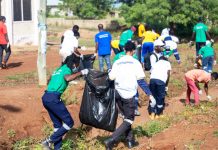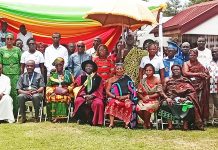As the world marks 16 days of activism, the Gender Centre for Empowering Development (GenCED), a Non-Governmental Organisation (NGO) has called on the government to invest in the Gender Based Violence Survivor Support Fund.
‘The Gender Center for Empowering Development (GenCED) joins with the survivors and champions of elimination of sexual and gender-based violence to call for the ratification of policies and laws that protect women as well as fair resource distribution to government departments meant to ensure the safety of women”, the Executive Director for GenCED, Madam Esther Tawiah, told The Chronicle in a statement signed and issued in Sunyani.
The theme for this year’s campaign is: “UNITE! Invest to prevent violence against women and girls”.
According to GenCED, sexual and gender based violence both stem from gender inequality.
“It is not only used as a means of subjugation and control, but also often prevents those who experience it from exercising their political, social, and economic rights, leading to further underrepresentation and marginalization”, Madam Tawiah said.
In Ghana, 37% of women have experienced gender-based violence in various forms from their partners, according to the UNwomen 2022 report).
The number has been steadily on the rise since the pandemic when the world experienced a backslide in equality efforts and especially on women rights.
“This is quite unfortunate as for most women, the reality of violence starts as early as the age of fifteen years”, GenCED said in the statement.
“As a women’s rights organization, GenCED is at the forefront advocating for the elimination of gender-based violence, action from the government and other stakeholders in this regard”, Madam Tawiah said.
She added that “Despite advocacy efforts, cases of femicides in the country have been on the rise especially this year with justice being served sparingly to survivors and their families”.
“This can partly be attributed to pressing economic times, stereotyped gender roles and struggle for power between genders that create tension in communities”, she said.
GenCED also observed that the cost of seeking medical and legal services is also quite expensive for most Ghanaians, deepening the poverty line for most households.
“Services such as medical checkups for evidence collection, treatment, procurement of police forms, legal representation and logistical finances tally up to GHC 900.00 ($75) (UNICEF) which is almost 10% of annual expenditure in most homes”, GenCED said in the statement .
Madam Tawiah noted that aside from the financial implications, there is also the emotional toil survivors have to go through recounting the violent acts with minimal to no psychological counseling support.
She was optimistic that through gender responsive budgeting and allocation to state agencies such as the Ministry of Gender, Children and Social Protection, the domestic Act can be operationalised.
“This will equip the domestic violence fund meant to aid the survivors of GBV thus improving the economic and societal state of Ghana”, she said.
According to GenCED, the fund can materialize as rehabilitation centers, shelters for survivors and subsidized medical and legal practices.
She said Ghana stands to gain more if all its citizens feel protected and catered for in the national budgeting and allocation.
Madam Tawiah also said productivity in both private and public sectors will thrive if all involved are able to carry out their work in good psychological and physical health.
She noted that funds spent in catering for victims and survivors can be relocated to mitigation stages thus saving more lives and preventing budgetary losses.
GenCED proposed symbiotic relationships between government, private and non-profit organisations for advocacy efforts that will create awareness in communities regarding GBV.
GenCED further observed that in rural areas where perpetrators and victims are unable to identify acts of violence, justice is rarely sought, creating an environment of inequality and oppression.
The NGO said “through engagement with the community and local administration, we can create awareness at the grassroot level and uphold the rights of women and girls”’.









